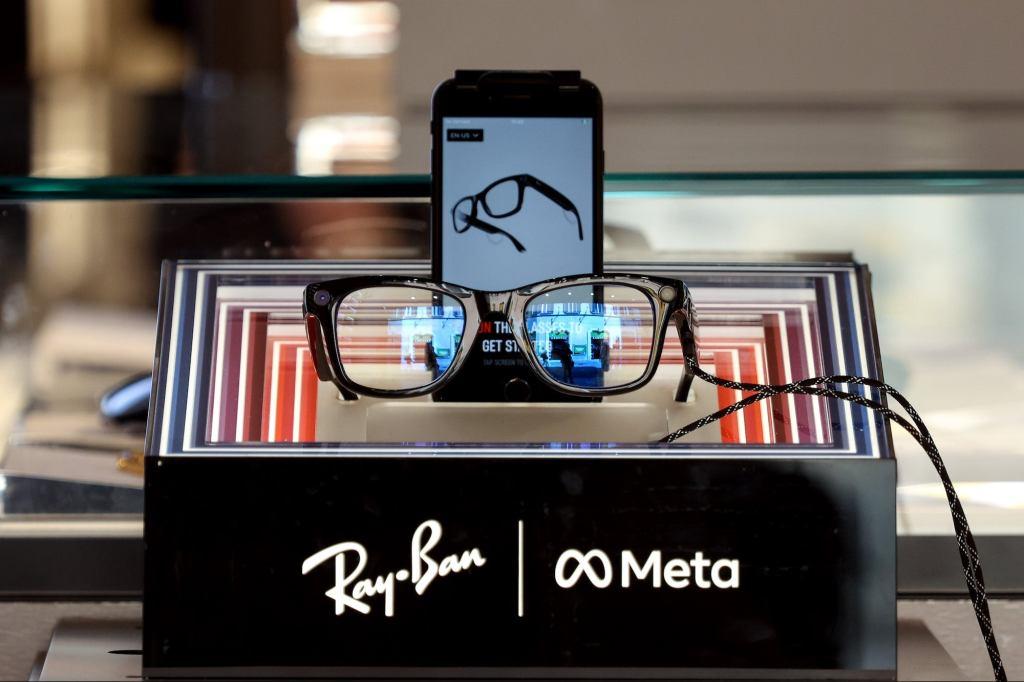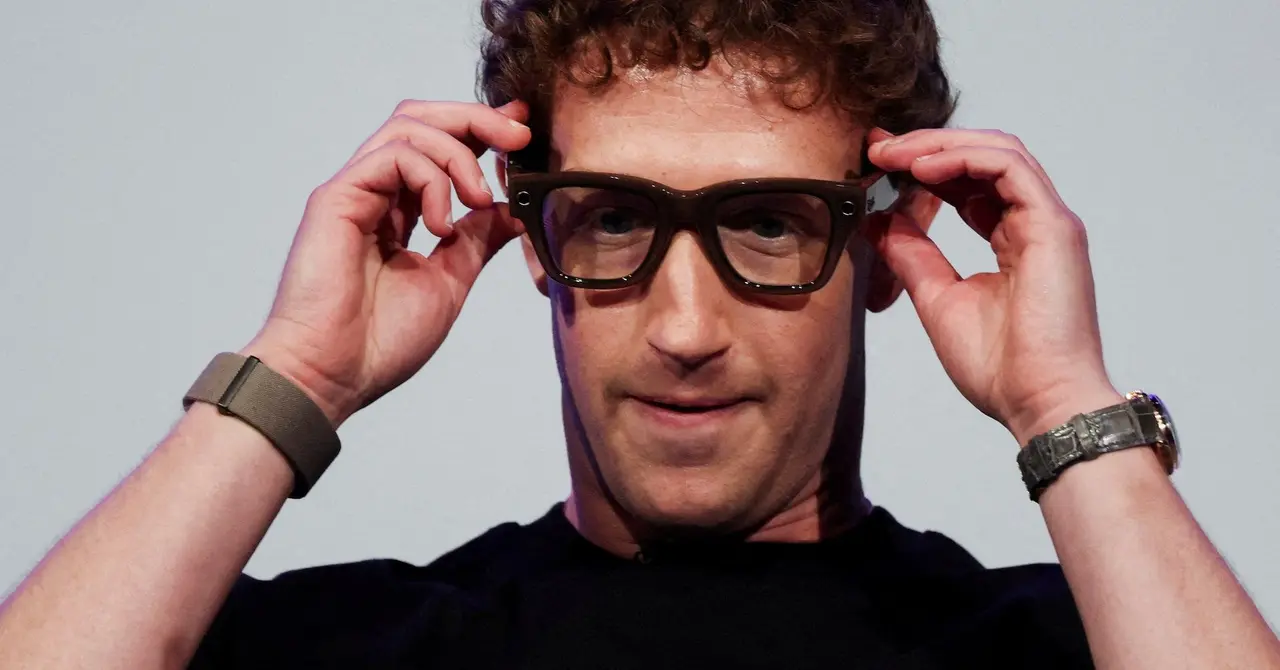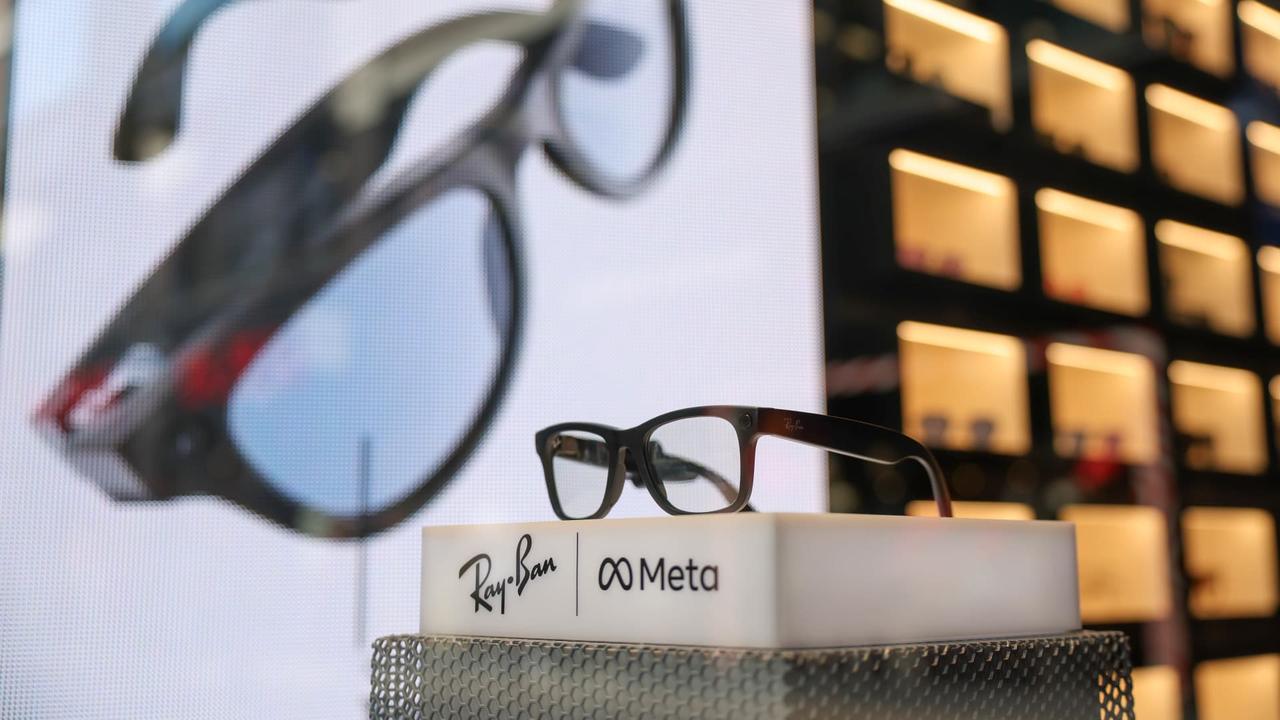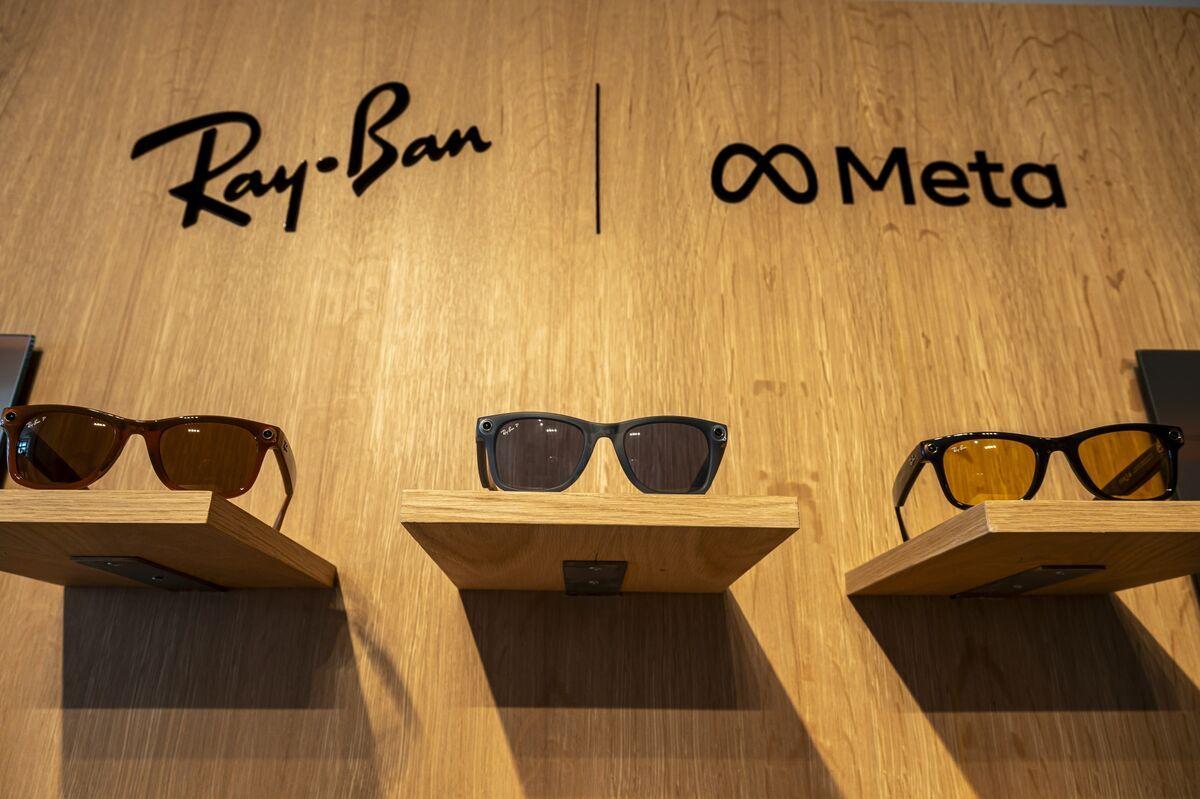EssilorLuxottica's Shares Soar as Meta AI Glasses Drive Record Sales
6 Sources
6 Sources
[1]
Ray-Ban maker shares hits all-time high as investors bet on Meta AI glasses boom
Oct 17 (Reuters) - Shares in Ray-Ban maker EssilorLuxottica (ESLX.PA), opens new tab rose 14% to hit an all-time high on Friday, adding nearly $20 billion in market value as investor enthusiasm for its AI-powered Ray-Ban Meta (META.O), opens new tab glasses gathered momentum. The Paris-listed group, founded by late Italian entrepreneur Leonardo Del Vecchio and a possible contender in the race to buy fashion group Armani, reported on Thursday third-quarter sales growth of 11.7% from a year ago to 6.9 billion euros ($8.1 billion). The results beat expectations and marked the company's best quarterly performance ever amid strong demand for wearable products such as the smart glasses it has been developing with Meta since before the pandemic. Even though the smart glasses business has until now accounted for only a fraction of EssilorLuxottica's total revenue, it has become a focal point for analysts and investors, as well as a catalyst for the company's investments. Barclays analysts have predicted smart glasses could become the most disruptive innovation since mobile phones, forecasting 60 million units sold globally by 2035. The AI-powered glasses contributed over four percentage points to sales growth, said Chief Financial Officer Stefano Grassi, with demand prompting EssilorLuxottica to accelerate production capacity plans for the glasses ahead of schedule. "The exponential growth of wearables provided an extra-boost to the top line performance," the company said in a statement on Thursday. SHARES POST BIGGEST DAILY RISE SINCE 2008 EssilorLuxottica's shares were up 13.8% by 1400GMT, the biggest daily gain since 2008, lifting the company's market capitalisation to 126.5 billion euros. Item 1 of 4 Meta CEO Mark Zuckerberg wears the Meta Ray-Ban Display glasses, as he delivers a speech presenting the new line of smart glasses, during the Meta Connect event at the company's headquarters in Menlo Park, California, U.S., September 17, 2025. REUTERS/Carlos Barria TPX IMAGES OF THE DAY [1/4]Meta CEO Mark Zuckerberg wears the Meta Ray-Ban Display glasses, as he delivers a speech presenting the new line of smart glasses, during the Meta Connect event at the company's headquarters in Menlo Park, California, U.S., September 17, 2025. REUTERS/Carlos Barria TPX IMAGES OF THE DAY Purchase Licensing Rights, opens new tab The move drove the European luxury benchmark Stoxx Europe Luxury 10 up over 7% on the week, the index's biggest weekly gain since January. The latest Ray-Ban Meta models, priced from $379 to $799 for a new flagship version with built-in display, are currently sold in limited physical stores with expansion to Canada, France, Italy and Britain planned for early 2026. The emerging success of Meta's Ray-Ban smart glasses has reignited a long dead category of eyewear computers as Google (GOOGL.O), opens new tab and Microsoft (MSFT.O), opens new tab had previously abandoned the market. By marrying upgraded cameras and generative AI features with Ray-Ban's designs, Meta has lured big tech rivals back into the market. Google and Samsung are working on glasses based on the Android XR platform. Apple (AAPL.O), opens new tab is reportedly working on smart glasses. J.P. Morgan analysts said in a note to investors the smart glasses were now a "material growth driver" while the company's core business remained resilient. Equita analysts upgraded their annual revenue forecast for wearables, and now expect an impact on the group's sales of about one billion euro this year, according to a research note. "The acceleration in third-quarter revenues and the level of confidence expressed on fourth-quarter and mid-term prospects are an important indicator of the success of the group's strategic drivers," they said. ($1 = 0.8540 euros) Reporting by Gianluca Lo Nostro, additional reporting by Laura Contemori and Elisa Anzolin; Editing by Milla Nissi-Prussak, Lisa Jucca and Matt Scuffham Our Standards: The Thomson Reuters Trust Principles., opens new tab * Suggested Topics: * Stocks * Medtech Gianluca Lo Nostro Thomson Reuters Gianluca is a markets reporter based in Gdansk, where he covers equities and companies in France and the Benelux countries, with a keen focus on media, telecoms and fintech. Previously, he worked as a journalist in Italy, covering various beats ranging from international business and finance.
[2]
Ray-Ban maker EssilorLuxottica says Meta smart glasses are boosting growth
Meta Ray-Ban Gen 2 AI glasses during the Meta Connect event in Menlo Park, California, US, on Wednesday, Sept. 17, 2025. EssilorLuxottica said a healthy amount of its revenue growth in the third quarter was due to its partnership with Meta, primarily from its Ray-Ban brand, to develop and sell smart glasses. "Clearly there is a lift coming from Ray-Ban Meta wearables as a product category," CFO Stefano Grassi said on the company's third-quarter earnings call. The European eyewear company said sales in in the quarter grew 11.7% year-over-year to 6.9 billion euros (about $8 billion) from 6.44 billion euros a year earlier. Of that growth, more than 4 percentage points came from wearables, which includes the Meta products, the company said. In 2019, Meta and Luxottica inked a deal for Ray-Ban Meta branded smart glasses. Most recently, Luxottica's Oakley brand has joined the partnership, with the debut in June of the Oakley Meta HSTN smart glasses. The companies are also working on a version of the smart glasses to be released under the Prada brand, CNBC reported in June. Luxottica, which also oversees several popular brands like Vogue Eyewear and Persol, has been heavily pushing internet-connected glasses that work with Meta's AI-powered digital assistant. The technology allows users to play music, take photos and perform other actions similar to how they would use smartphones. "We believe that glasses will be the future," Grassi said, adding that the wearables business is profitable. "Glasses will materially replace most of the functionality that today we have embedded into our phones." Grassi's statement echoes sentiments expressed by Meta CEO Mark Zuckerberg, who said in July that "Personal devices like glasses that understand our context because they can see what we see, hear what we hear, and interact with us throughout the day will become our primary computing devices." A couple weeks into the fourth quarter, Grassi said he has "a good degree of optimism" for the period, in part because of the rollout of "all the new products that have been recently presented at the Meta Connect," which will "all play a role in our fourth-quarter profile." At the Connect event in September, Zuckerberg revealed the $799 Meta Ray-Ban Display glasses, which have a small digital display that can be manipulated with an accompanying wristband powered by neural technology. The company also unveiled new smart glasses, including the $499 Oakley Meta Vanguard glasses and the $379 Ray-Ban Meta (Gen 2) glasses. Grassi said that Luxottica's sales growth in North America in the third quarter had more to do with the Ray-Ban Meta glasses than the effects of tariffs, which led to higher prices for its products. He said the company will be able to reach the 10 million unit capacity that it had originally planned to hit by the end of 2026 earlier than anticipated. "The overall ecosystem of wearables is going to bring not only revenue associated with the hardware but also the revenue associated with lenses" and over time from services tied to AI. EssilorLuxottica shares rose 2.4% on Thursday. Meta isn't the only tech giant getting into the burgeoning smart glasses market.
[3]
Meta's Ray-Ban Maker Says Its AI Smart Glasses Could Be the New Smartphone as Sales Skyrocket
EssilorLuxottica says sales of the glasses had tripled by mid-year and further contributed to the company's 11% revenue growth in the third-quarter. Meta CEO Mark Zuckerberg thinks smart glasses could be the new smartphone, and Meta's partnership with the world's biggest eyewear maker, EssilorLuxottica, has the sales to prove it. "Clearly, there is a lift coming from Ray-Ban Meta wearables as a product category," said EssilorLuxottica CFO Stefano Grassi on the company's third-quarter earnings call on Thursday, per CNBC. The European eyewear giant said that sales grew by 11.7% year-over-year -- 4% of which came from wearables, notably its Ray-Ban Meta product. Related: She Sent a Cold Email to Meta, Judging Its Ray-Bans. Now She Runs the Wearables Division. "We believe that glasses will be the future," Grassi said. "Glasses will materially replace most of the functionality that today we have embedded into our phones." Meanwhile, last month in the keynote address at Meta Connect, Zuckerberg told the crowd that he wasn't surprised that "AI glasses are taking off." "The sales trajectory that we've seen is similar to some of the most popular consumer electronics of all time," he said. EssilorLuxottica and Meta have been partners since 2019. EssilorLuxottica controls almost 80% of the eyewear industry and owns retail chains, Sunglass Hut and LensCrafters. Meta also released the $499 Oakley smartglasses in June, which are made for athletes and offer higher-resolution recording and a 40% longer battery life lasting up to eight hours. Meanwhile, the success has led other tech giants to create their own. Apple, Google, and Amazon are reportedly working on their own smart glasses.
[4]
Ray-Ban maker shares hits all-time high as investors bet on Meta AI glasses boom
Shares in Ray-Ban maker EssilorLuxottica rose 14 per cent to hit an all-time high on Friday, adding nearly US$20 billion in market value as investor enthusiasm for its AI-powered Ray-Ban Meta glasses gathered momentum. The Paris-listed group, founded by late Italian entrepreneur Leonardo Del Vecchio and a possible contender in the race to buy fashion group Armani, reported on Thursday third-quarter sales growth of 11.7 per cent from a year ago to 6.9 billion euros ($8.1 billion). The results beat expectations and marked the company's best quarterly performance ever amid strong demand for wearable products such as the smart glasses it has been developing with Meta since before the pandemic. Even though the smart glasses business has until now accounted for only a fraction of EssilorLuxottica's total revenue, it has become a focal point for analysts and investors, as well as a catalyst for the company's investments. Barclays analysts have predicted smart glasses could become the most disruptive innovation since mobile phones, forecasting 60 million units sold globally by 2035. The AI-powered glasses contributed over four percentage points to sales growth, said Chief Financial Officer Stefano Grassi, with demand prompting EssilorLuxottica to accelerate production capacity plans for the glasses ahead of schedule. "The exponential growth of wearables provided an extra-boost to the top line performance," the company said in a statement on Thursday. EssilorLuxottica's shares were up 13.8 per cent by 1400GMT, the biggest daily gain since 2008, lifting the company's market capitalisation to 126.5 billion euros. The move drove the European luxury benchmark Stoxx Europe Luxury 10 up over 7% on the week, the index's biggest weekly gain since January. The latest Ray-Ban Meta models, priced from $379 to $799 for a new flagship version with built-in display, are currently sold in limited physical stores with expansion to Canada, France, Italy and Britain planned for early 2026. The emerging success of Meta's Ray-Ban smart glasses has reignited a long dead category of eyewear computers as Google and Microsoft MSFT.O had previously abandoned the market. By marrying upgraded cameras and generative AI features with Ray-Ban's designs, Meta has lured big tech rivals back into the market. Google and Samsung are working on glasses based on the Android XR platform. Apple is reportedly working on smart glasses. J.P. Morgan analysts said in a note to investors the smart glasses were now a "material growth driver" while the company's core business remained resilient. Equita analysts upgraded their annual revenue forecast for wearables, and now expect an impact on the group's sales of about one billion euro this year, according to a research note. "The acceleration in third-quarter revenues and the level of confidence expressed on fourth-quarter and mid-term prospects are an important indicator of the success of the group's strategic drivers," they said.
[5]
Ray-Ban maker shares hits all-time high as investors bet on Meta AI glasses boom
(Reuters) -Shares in Ray-Ban maker EssilorLuxottica rose 14% to hit an all-time high on Friday, adding nearly $20 billion in market value as investor enthusiasm for its AI-powered Ray-Ban Meta glasses gathered momentum. The Paris-listed group, founded by late Italian entrepreneur Leonardo Del Vecchio and a possible contender in the race to buy fashion group Armani, reported on Thursday third-quarter sales growth of 11.7% from a year ago to 6.9 billion euros ($8.1 billion). The results beat expectations and marked the company's best quarterly performance ever amid strong demand for wearable products such as the smart glasses it has been developing with Meta since before the pandemic. Even though the smart glasses business has until now accounted for only a fraction of EssilorLuxottica's total revenue, it has become a focal point for analysts and investors, as well as a catalyst for the company's investments. Barclays analysts have predicted smart glasses could become the most disruptive innovation since mobile phones, forecasting 60 million units sold globally by 2035. The AI-powered glasses contributed over four percentage points to sales growth, said Chief Financial Officer Stefano Grassi, with demand prompting EssilorLuxottica to accelerate production capacity plans for the glasses ahead of schedule. "The exponential growth of wearables provided an extra-boost to the top line performance," the company said in a statement on Thursday. SHARES POST BIGGEST DAILY RISE SINCE 2008 EssilorLuxottica's shares were up 13.8% by 1400GMT, the biggest daily gain since 2008, lifting the company's market capitalisation to 126.5 billion euros. The move drove the European luxury benchmark Stoxx Europe Luxury 10 up over 7% on the week, the index's biggest weekly gain since January. The latest Ray-Ban Meta models, priced from $379 to $799 for a new flagship version with built-in display, are currently sold in limited physical stores with expansion to Canada, France, Italy and Britain planned for early 2026. The emerging success of Meta's Ray-Ban smart glasses has reignited a long dead category of eyewear computers as Google and Microsoft had previously abandoned the market. By marrying upgraded cameras and generative AI features with Ray-Ban's designs, Meta has lured big tech rivals back into the market. Google and Samsung are working on glasses based on the Android XR platform. Apple is reportedly working on smart glasses. J.P. Morgan analysts said in a note to investors the smart glasses were now a "material growth driver" while the company's core business remained resilient. Equita analysts upgraded their annual revenue forecast for wearables, and now expect an impact on the group's sales of about one billion euro this year, according to a research note. "The acceleration in third-quarter revenues and the level of confidence expressed on fourth-quarter and mid-term prospects are an important indicator of the success of the group's strategic drivers," they said. ($1 = 0.8540 euros) (Reporting by Gianluca Lo Nostro, additional reporting by Laura Contemori and Elisa Anzolin; Editing by Milla Nissi-Prussak, Lisa Jucca and Matt Scuffham)
[6]
EssilorLuxottica sales boosted by Meta AI glasses
(Reuters) -Ray-Ban maker EssilorLuxottica posted record third-quarter sales on Thursday and said it would accelerate production capacity for its booming smart glasses business. The eyewear giant, which is riding a wave of consumer appetite for AI-powered wearables, said revenue in the quarter through September rose 11.7% year-on-year to 6.9 billion euros ($8.1 billion), the company's best quarterly performance ever. The result exceeded the 6.7 billion euro average forecast in an LSEG poll. Quarterly sales in North America, the eyewear giant's largest market, were also up 12.1% from last year. PRICES RAISED IN RESPONSE TO TARIFFS EssilorLuxottica has raised U.S. prices in response to tariffs and expects the benefits of these increases, which will mean U.S. consumers paying more for premium eyewear brands, in the second half of the year. However, finance chief Stefano Grassi said in a call with analysts on Thursday that the impact of price increases has not been the "primary driver" of overall growth in North America. Grassi also said the company would bring forward plans to build 10 million units of annual production capacity for wearables ahead of its original timeline to meet a stronger than expected demand. "We are in a position to anticipate that build-up capacity before what we shared at the beginning, so it will come earlier than the end of 2026," the CFO said. RAY-BAN META GLASSES DRIVING GROWTH Despite early skepticism, the smart glasses produced alongside Meta Platforms have been a commercial success in recent years as artificial intelligence features were ramped up later. The revamped second-generation Ray-Ban Meta smart glasses, featuring battery and camera improvements, launched in September at $379, up from $299 for the previous generation. A new $799 flagship model expands AI features with a built-in display and a wristband that translates hand gestures into commands such as responding to texts and calls. The glasses are currently available in a limited number of physical stores. Rollout to Canada, France, Italy and Britain is planned in early 2026. ($1 = 0.8572 euros) (Reporting by Gianluca Lo Nostro; Editing by Matt Scuffham)
Share
Share
Copy Link
Ray-Ban maker EssilorLuxottica's stock hits an all-time high, driven by strong demand for AI-powered smart glasses developed in partnership with Meta. The company reports exceptional Q3 growth, with wearables contributing significantly to sales.
EssilorLuxottica Surges with AI Smart Glasses
Eyewear giant EssilorLuxottica's shares hit an all-time high, propelled by its AI-powered Ray-Ban Meta smart glasses, a successful Meta collaboration
1
. Strong Q3 sales, significantly boosted by these wearables, fueled substantial market growth. Accelerated production and expanded global distribution by early 2026 mark EssilorLuxottica's smart eyewear leadership2
4
.
Source: Entrepreneur
Tech Giants Embrace Wearables' Future
EssilorLuxottica's smart glasses success revitalized the eyewear computer sector, attracting renewed interest from major tech players. Google, Samsung, and Apple are reportedly developing their own smart glasses, signaling a highly competitive and innovative future for wearables, now poised for significant advancements
1
.
Source: BNN
Related Stories
Glasses: The Next Primary Computing Interface
Analysts predict smart glasses will be a transformative innovation, disrupting markets akin to mobile phones, with substantial global sales projected by 2035
4
. EssilorLuxottica's CFO and Meta's CEO envision glasses replacing most smartphone functions, becoming primary, context-aware computing devices integrated into daily life3
2
.
Source: Reuters
References
Summarized by
Navi
[3]
Related Stories
Ray-Ban Meta Smart Glasses Sales Triple, Driving EssilorLuxottica's Revenue Growth
29 Jul 2025•Technology

EssilorLuxottica sells 7 million AI glasses in 2025, tripling sales as Meta partnership surges
11 Feb 2026•Business and Economy

Meta Invests $3.5 Billion in EssilorLuxottica, Boosting AI-Powered Smart Glasses Push
09 Jul 2025•Technology

Recent Highlights
1
ByteDance Faces Hollywood Backlash After Seedance 2.0 Creates Unauthorized Celebrity Deepfakes
Technology

2
Microsoft AI chief predicts artificial intelligence will automate most white-collar jobs in 18 months
Business and Economy

3
Google reports state-sponsored hackers exploit Gemini AI across all stages of cyberattacks
Technology





